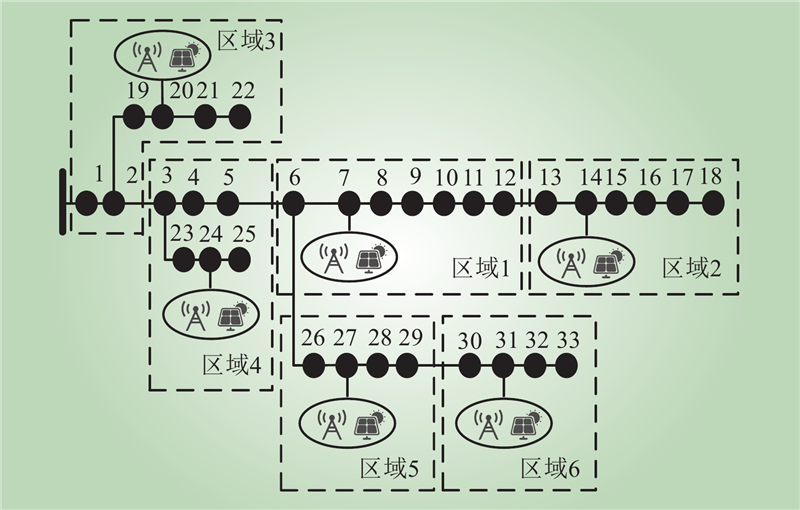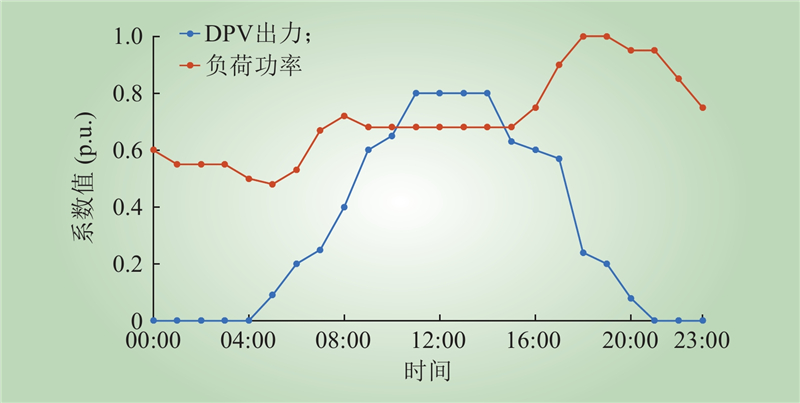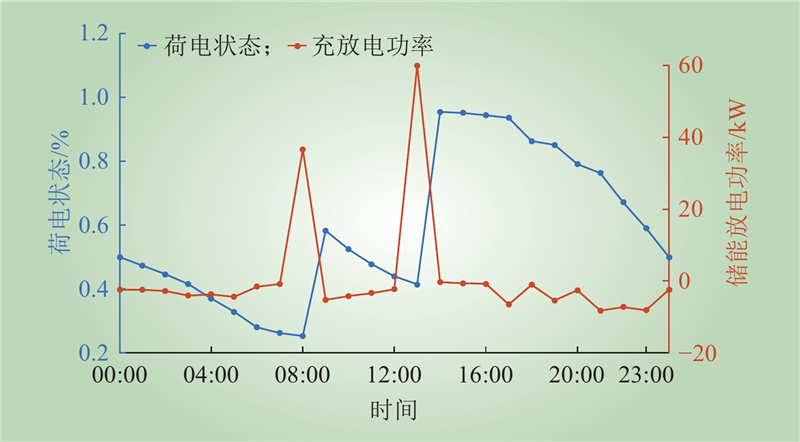| 1 |
陈奇芳, 李若凡, 夏明超, 等. 计及多维性能评估的新型配电网光伏选址定容方法[J]. 中国电力, 2024, 57 (10): 172- 178, 207.
|
|
CHEN Qifang, LI Ruofan, XIA Mingchao, et al. Photovoltaic site selection and capacity determination method for new distribution network considering multidimensional performance evaluation[J]. Electric Power, 2024, 57 (10): 172- 178, 207.
|
| 2 |
肖勇, 肖小兵, 金鑫, 等. 含储能和分布式光伏的配电网系统计及静态电压稳定性的多目标优化[J]. 广东电力, 2024, 37 (4): 24- 32.
|
|
XIAO Yong, XIAO Xiaobing, JIN Xin, et al. Multi-objective optimization of distribution network system with energy storage and distributed photovoltaic considering static voltage stability[J]. Guangdong Electric Power, 2024, 37 (4): 24- 32.
|
| 3 |
杨旭, 王瑞, 余畅文, 等. 基于改进灰狼优化算法的分布式能源系统优化调度[J]. 内蒙古电力技术, 2023, 41 (1): 26- 33.
|
|
YANG Xu, WANG Rui, YU Changwen, et al. Optimal scheduling of distributed energy system based on improved grey wolf optimization algorithm[J]. Inner Mongolia Electric Power, 2023, 41 (1): 26- 33.
|
| 4 |
徐恒辉, 姚杰, 周萍, 等. 基于运行数据的光伏电站状态评估方法研究[J]. 电力科技与环保, 2023, 39 (5): 450- 456.
|
|
XU Henghui, YAO Jie, ZHOU Ping, et al. Research on photovoltaic power plant state evaluation based on operating data[J]. Electric Power Technology and Environmental Protection, 2023, 39 (5): 450- 456.
|
| 5 |
魏欣荣, 吴俊勇, 丁然, 等. 基于光伏重心理论的配电网分布式光伏最大准入容量计算[J]. 电网技术, 2023, 47 (11): 4533- 4549.
|
|
WEI Xinrong, WU Junyong, DING Ran, et al. Distributed PV hosting capacity calculation of distribution network based on PV barycenter theory[J]. Power System Technology, 2023, 47 (11): 4533- 4549.
|
| 6 |
YAO Y Y, DING F, HOROWITZ K, et al. Coordinated inverter control to increase dynamic PV hosting capacity: a real-time optimal power flow approach[J]. IEEE Systems Journal, 2022, 16 (2): 1933- 1944.
|
| 7 |
刘科研, 盛万兴, 马晓晨, 等. 基于多种群遗传算法的分布式光伏接入配电网规划研究[J]. 太阳能学报, 2021, 42 (6): 146- 155.
|
|
LIU Keyan, SHENG Wanxing, MA Xiaochen, et al. Planning research of distributed photovoltaic source access distribution network based on multi-population genetic algorithm[J]. Acta Energiae Solaris Sinica, 2021, 42 (6): 146- 155.
|
| 8 |
WU H, YUAN Y, ZHU J P, et al. Potential assessment of spatial correlation to improve maximum distributed PV hosting capacity of distribution networks[J]. Journal of Modern Power Systems and Clean Energy, 2021, 9 (4): 800- 810.
|
| 9 |
李俊双, 胡炎, 邰能灵. 计及通信负载与供电可靠性的5G基站储能与配电网协同优化调度[J]. 上海交通大学学报, 2023, 57 (7): 791- 802.
|
|
LI Junshuang, HU Yan, TAI Nengling. Collaborative optimization scheduling of 5G base station energy storage and distribution network considering communication load and power supply reliability[J]. Journal of Shanghai Jiao Tong University, 2023, 57 (7): 791- 802.
|
| 10 |
陈永奎, 李红梅, 朱继红. 基于5G通信的配电网差动保护工程应用研究[J]. 浙江电力, 2023, 42 (8): 107- 114.
|
|
CHEN Yongkui, LI Hongmei, ZHU Jihong. Engineering application research on differential protection of distribution network based on 5G communication[J]. Zhejiang Electric Power, 2023, 42 (8): 107- 114.
|
| 11 |
李金雨, 宋福龙, 马俊杰, 等. 基于5G基站可调度潜力与配电网集群划分的储能选址定容方法[J]. 电力系统自动化, 2023, 47 (18): 151- 160.
|
|
LI Jinyu, SONG Fulong, MA Junjie, et al. Siting and sizing method for energy storage based on dispatchable potential of 5G base station and cluster partition of distribution network[J]. Automation of Electric Power Systems, 2023, 47 (18): 151- 160.
|
| 12 |
李昆, 方家琨, 艾小猛, 等. 考虑通信与配套设备协调优化的大规模5G宏基站网络能量管理模型[J]. 中国电机工程学报, 2023, 43 (14): 5391- 5404.
|
|
LI Kun, FANG Jiakun, AI Xiaomeng, et al. Energy management model of large-scale 5G macro base station network considering the coordinated optimization of communication equipment and standard equipment[J]. Proceedings of the CSEE, 2023, 43 (14): 5391- 5404.
|
| 13 |
ZHOU Y Y, WANG Q G, ZOU Y, et al. Voltage profile optimization of active distribution networks considering dispatchable capacity of 5G base station backup batteries[J]. Journal of Modern Power Systems and Clean Energy, 2023, 11 (6): 1842- 1856.
|
| 14 |
POST B, BORST S, VAN DEN BERG H. A self-organizing base station sleeping and user association strategy for dense cellular networks[J]. Wireless Networks, 2021, 27 (1): 307- 322.
|
| 15 |
ZHANG S L, LIU N, HAN J P. Optimization of energy storage resources in 5G base stations considering operation reliability[C]//2023 IEEE 18th Conference on Industrial Electronics and Applications (ICIEA). Ningbo, China. IEEE, 2023: 596–602.
|
| 16 |
段瑶, 高崇, 程苒, 等. 考虑5G基站可调度潜力的配电网分布式光伏最大准入容量评估[J]. 中国电力, 2023, 56 (12): 80- 85, 99.
|
|
DUAN Yao, GAO Chong, CHENG Ran, et al. Evaluation of distributed photovoltaic maximum hosting capacity for distribution network considering dispatchable potential of 5G base station[J]. Electric Power, 2023, 56 (12): 80- 85, 99.
|
| 17 |
麻秀范, 刘子豪, 王颖, 等. 考虑通信负载迁移及储能动态备电的5G基站光伏消纳能力研究[J]. 电工技术学报, 2023, 38 (21): 5832- 5845, 5922.
|
|
MA Xiufan, LIU Zihao, WANG Ying, et al. Research on photovoltaic absorption capacity of 5G base station considering communication load migration and energy storage dynamic backup[J]. Transactions of China Electrotechnical Society, 2023, 38 (21): 5832- 5845, 5922.
|
| 18 |
雍培, 张宁, 慈松, 等. 5G通信基站参与需求响应: 关键技术与前景展望[J]. 中国电机工程学报, 2021, 41 (16): 5540- 5552.
|
|
YONG Pei, ZHANG Ning, CI Song, et al. 5G communication base stations participating in demand response: key technologies and prospects[J]. Proceedings of the CSEE, 2021, 41 (16): 5540- 5552.
|
| 19 |
张禄澳, 范一芳, 王宇轩, 等. 光储式5G通信基站集群灵活性聚合与协同调度策略[J]. 电力系统保护与控制, 2024, 52 (2): 101- 110.
|
|
ZHANG Luao, FAN Yifang, WANG Yuxuan, et al. Flexible aggregation and coordinated scheduling strategy for renewable powered 5G communication base station clusters[J]. Power System Protection and Control, 2024, 52 (2): 101- 110.
|
| 20 |
廖小兵, 张敏, 乐健, 等. 考虑循环寿命折损的主动配电网仿射可调鲁棒优化方法[J]. 电力系统保护与控制, 2023, 51 (8): 37- 49.
|
|
LIAO Xiaobing, ZHANG Min, LE Jian, et al. Affinely adjustable robust optimal operation strategy for an active distribution network considering cycle life loss[J]. Power System Protection and Control, 2023, 51 (8): 37- 49.
|
| 21 |
陈虹宇, 李星梅, 王玉玮. 含电动船充电站的海岛光储微网系统容量优化配置[J]. 智慧电力, 2024, 52 (2): 48- 54.
|
|
CHEN Hongyu, LI Xingmei, WANG Yuwei. Optimal capacity configuration of island photovoltaic storage microgrid system with electric ship charging station[J]. Smart Power, 2024, 52 (2): 48- 54.
|
| 22 |
方一晨, 张沈习, 程浩忠, 等. 含智能软开关的主动配电网分布式光伏准入容量鲁棒优化[J]. 电力系统自动化, 2021, 45 (7): 8- 17.
|
|
FANG Yichen, ZHANG Shenxi, CHENG Haozhong, et al. Robust optimization of distributed photovoltaic hosting capacity of active distribution network with soft open point[J]. Automation of Electric Power Systems, 2021, 45 (7): 8- 17.
|
| 23 |
ABDELOUADOUD S Y, GIRARD R, NEIRAC F P, et al. Optimal power flow of a distribution system based on increasingly tight cutting planes added to a second order cone relaxation[J]. International Journal of Electrical Power & Energy Systems, 2015, 69, 9- 17.
|
| 24 |
DING T, LI C, YANG Y H, et al. A two-stage robust optimization for centralized-optimal dispatch of photovoltaic inverters in active distribution networks[J]. IEEE Transactions on Sustainable Energy, 2017, 8 (2): 744- 754.
|
| 25 |
BARAN M E, WU F F. Network reconfiguration in distribution systems for loss reduction and load balancing[J]. IEEE Transactions on Power Delivery, 1989, 4 (2): 1401- 1407.
|





